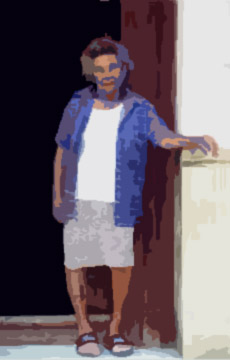|
In the Heat of Summer(continued) By Marta Palos August Today is my birthday, and Brian wants to take me to a fancy restaurant
for dinner. But why spend money on this type of thing when I could buy
yards and yards of canvas with it? We settle on a pizza joint on Mountain View Avenue. At the next table
sits a noisy family of four. Father and the two boys wear baseball caps,
mom a flowery polyester dress. Before them a large pizza sits with a
green candle stuck in the middle. The younger boy produces a red carnation,
leans over and gives mom a Pepsi-tainted kiss. Dad lights the candle,
and they all break into the birthday song. The table soon turns into
a mess of bottle caps and bits of pizza. The father burps. Brian throws his napkin on the table. "Sorry to rush you, Cora,
but finish your pizza and let's get the hell out of here." I take my time, to let him know I have nothing against plain folks.
On our way to the jeep I spot a rancher standing on the sidewalk, wearing
a pair of elaborately stitched cowboy boots and a five-gallon hat. Thumbs
stuck in his belt, he fixes his luminescent gray eyes on us, his disapproving
gaze shifting between the Indian and the Caucasian. I expect Brian to
stare him down, but he keeps on going. At last the man turns and walks
away. "Did you see that, Brian?" "See what?" "The rancher. He gave us a stare." "Well, what do you expect from an unschooled jerk?" Racial prejudice has nothing to do with schooling or the lack of it,
but why argue? In the jeep I watch the traffic. "It was about this time of the year we met, remember?" Brian
says. "Wasn't I smart to check out Arizona? Truth is, it's a more
interesting state than Kansas." I let that go unanswered and keep watching the traffic. Ahead of us
there's a car with a Mississippi license plate. From Mississippi my
mind jumps to Louisiana, and from Louisiana to my father. He was a fake. By the time I was six, the phony Indian lover had enough
of the hardship on the reservation and turned his back on us. Shortly
after he left mom died, and grandma took me in. All I know about my
father is what grandma told me. She told me my father was from New Orleans,
a rice harvester gone broke. He was also a highly critical man, finding
fault with just about everything on the mesa. After her Butterfly Clan my mother named me Butterfly Resting, my father
called me Cora. I have flashes of his gaunt figure. He sat a lot on
the rocks outside our shack with the dirt floor in Kikotsmovi, doing
nothing. My only toy was a Kachina doll I got one summer when the prayers
for a good harvest begin. Of all the holidays I liked Niman Kachina
best because we got gifts then, corn-cobs and sweets and Kachina dolls.
Rattles shook, and there was a good deal of excitement. I have two kinds of recurring dreams lately. One is about a garden filled with azaleas, and I see lots of people on the streets. That's New Orleans, I guess. The other is the scary kind, where everything is barren. I'm trying to peek down into the dark opening of a kiva, but the wind blows sand into my eyes and the sting makes me cry. The strange thing is, I have more dreams about the mesa than about
New Orleans. I even look forward to them. I'm waiting for Cora to come home, ready for reconciliation. At breakfast
this morning I quoted a line from a book called The Myth of Sisyphus
I read the night before, and she said, "Oh not again, Brian. Can't
you think for yourself for a change?" I slammed my coffee mug into the sink. "It's so damn easy for
the naturally talented to snub others, isn't it," I yelled at her.
On my way out the door I heard her cry. Tonight I want to get to the bottom of whatever her real problem is.
I can't believe it's my books. Maybe it's the heat, often close to a
hundred, making the brain boil. But how can you reconcile with an absent adversary? To pass the time,
I step into her sanctuary. The only ornament she has in the room is
a Kachina doll, tied to the easel. There's a large painting propped
against the wall I haven't seen so far. A lonely road runs across the
landscape, the skeleton trees black against a gray sky, the clouds covering
two third of the canvas. I wonder what happened to her reds and yellows.
|
